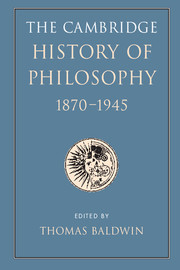Book contents
- Frontmatter
- Contents
- List of contributors
- Introduction
- I 1870–1914
- II 1914–1945
- 8 Logic and philosophy: the analytic programme
- 9 The diversity of philosophy
- 32 The continuing idealist tradition
- 33 Transformations in speculative philosophy
- 34 Realism, naturalism, and pragmatism
- 35 French Catholic philosophy
- 36 Spanish philosophy
- 37 The phenomenological movement
- 38 Heidegger
- 39 Latin american philosophy
- 40 Japanese philosophy
- 10 Knowledge, language, and the end of metaphysics
- 11 Philosophy and the exact sciences
- 12 Mind and its place in nature
- 13 Philosophy and social science
- 14 Ethics, religion, and the arts
- 15 Law and politics
- Biobibliographical appendix
- Bibliography
- INDEX
- References
39 - Latin american philosophy
from 9 - The diversity of philosophy
Published online by Cambridge University Press: 28 March 2008
- Frontmatter
- Contents
- List of contributors
- Introduction
- I 1870–1914
- II 1914–1945
- 8 Logic and philosophy: the analytic programme
- 9 The diversity of philosophy
- 32 The continuing idealist tradition
- 33 Transformations in speculative philosophy
- 34 Realism, naturalism, and pragmatism
- 35 French Catholic philosophy
- 36 Spanish philosophy
- 37 The phenomenological movement
- 38 Heidegger
- 39 Latin american philosophy
- 40 Japanese philosophy
- 10 Knowledge, language, and the end of metaphysics
- 11 Philosophy and the exact sciences
- 12 Mind and its place in nature
- 13 Philosophy and social science
- 14 Ethics, religion, and the arts
- 15 Law and politics
- Biobibliographical appendix
- Bibliography
- INDEX
- References
Summary
TWO SENSES OF ‘LATIN AMERICA’
‘Latin America’ is used as a collective noun to denote a number of states (nineteen in 1945) in North, Central, and South America. Each has idiosyncratic geographic, ethnic, cultural, social, political, and economic features. But in spite of their differences, Latin American countries share a common political origin (Spanish/Portuguese conquest), a similar linguistic heritage (Spanish/Portuguese), a dominant religion (Catholicism), and comparable predicaments vis-à-vis local, regional, and international affairs. It is no surprise, then, that Latin American countries show, by and large, similar patterns of development and evolution, and that the term ‘Latin America’ is also used to signify these shared traditions and relationships. Philosophical thinking is no exception to the rule. It has evolved in analogous periods, with similar influences and traditions, and produced comparable outputs. In referring to Latin American philosophy, therefore, I am presupposing this intensional sense of ‘Latin America’ and in what follows, I will ignore the national peculiarities associated with its extensional sense.
POSITIVISM VS. ANTIPOSITIVISM AND THE RISE OF ACADEMIC PHILOSOPHY
Positivism ruled the Latin American philosophical scene from 1870 to 1910. But from 1910 to 1920 onwards a wave of antipositivistic philosophies wiped out positivism and took over the stage. The antipositivist turn was influenced by a parallel and overlapping change in the institutional setting of philosophy. It was a turn from a non-academic to an academic practice, from a nonprofessional to a professional conception of the role of philosophy and philosophers. Philosophy departments and faculties, flourishing ‘athenea’ and ‘colleges’, became the proper places to learn and to do philosophy.
- Type
- Chapter
- Information
- The Cambridge History of Philosophy 1870–1945 , pp. 507 - 512Publisher: Cambridge University PressPrint publication year: 2003



